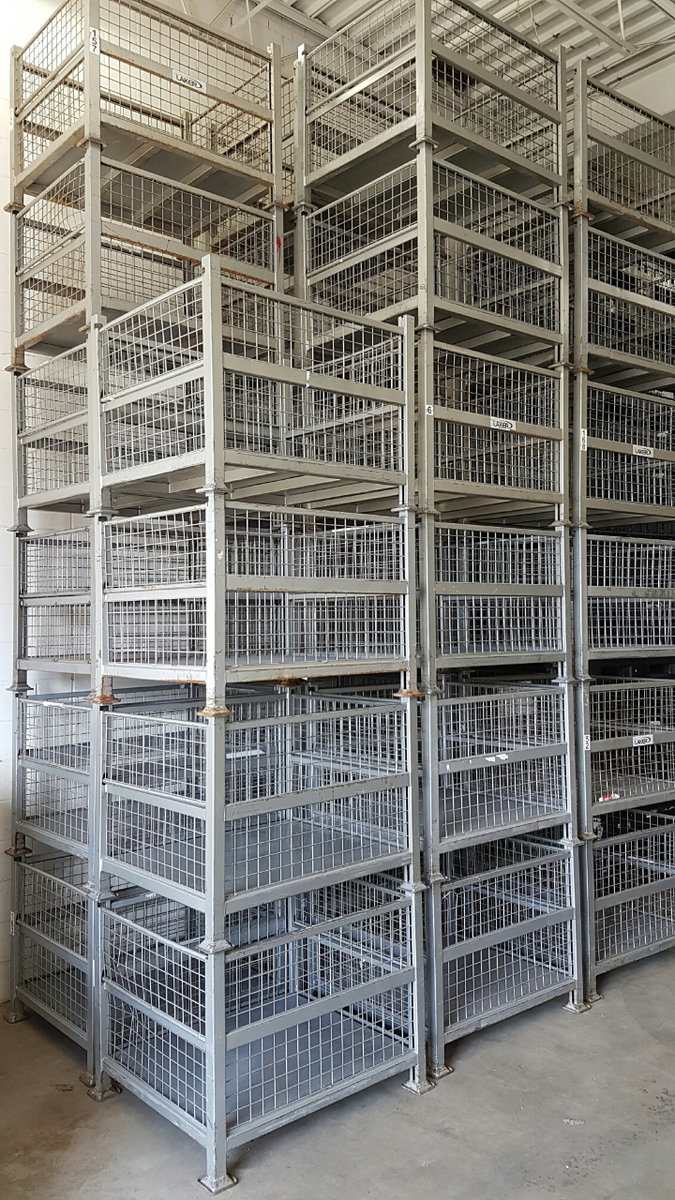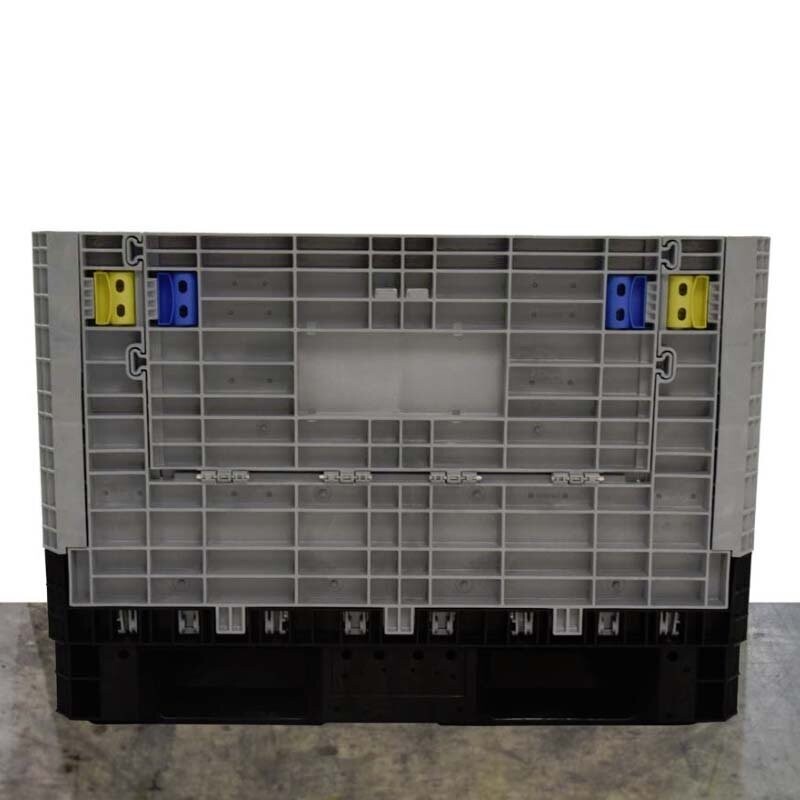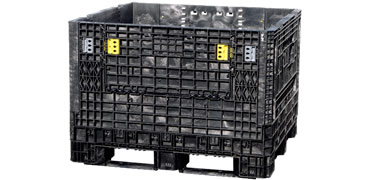Why Mass Containers Are Important for Sustainable and Cost-Effective Transportation
Bulk containers play a crucial role in modern logistics. They help with the effective movement of large amounts of products, thus maximizing transportation procedures. This method not just decreases prices but additionally minimizes ecological impact via reduced exhausts and waste generation. As industries look for even more sustainable practices, the fostering of mass containers is ending up being significantly considerable. What ramifications does this shift hold for future logistics and supply chain management?

The Advantages of Using Bulk Containers in Logistics
Mass containers change logistics by enhancing efficiency and sustainability. These containers enable the transport of large quantities of goods in a solitary journey, significantly lowering the variety of journeys needed. This not only improves operations but also reduces labor costs associated with handling, loading, and unloading. In enhancement, mass containers are created to enhance area use within transport cars, ensuring that even more items can be shipped at the same time.
The standardization of bulk containers likewise streamlines the logistics procedure. With uniform measurements, they can be easily stacked and saved, bring about enhanced storage facility administration. Furthermore, bulk containers frequently include sturdy products that safeguard contents from damages during transit, thus reducing item loss and increasing total reliability. As an outcome, companies can experience enhanced supply chain performance, ultimately bring about enhanced success and consumer complete satisfaction. This combination of elements makes mass containers an important property in contemporary logistics.
Ecological Impact: Decreasing Waste and Carbon Impact
As sectors significantly prioritize sustainability, the fostering of bulk containers has become a vital technique for lowering waste and decreasing carbon footprints. These containers minimize using packaging materials, such as boxes and plastic, thereby especially lowering general waste generation. By consolidating deliveries, bulk containers boost transport effectiveness, enabling for more items to be transferred per journey. This reduction in journeys directly correlates with lower greenhouse gas discharges, adding to a smaller carbon footprint.
Moreover, mass containers can often be reused or recycled, further minimizing environmental impact. The longevity of these containers assurances they can stand up to several transportation cycles, lowering the demand for single-use alternatives. used collapsible containers. By enhancing logistics and advertising effective source usage, bulk containers not just support lasting techniques yet also urge industries to straighten with worldwide environmental objectives. Ultimately, their application reflects a dedication to eco-friendly stewardship and accountable source administration
Price Savings: How Bulk Containers Lower Transportation Expenses
While several companies look for means to boost their lower line, using mass containers offers a significant possibility for decreasing transport costs. Mass containers optimize the volume of items carried, enabling businesses to ship larger amounts simultaneously. This effectiveness reduces the variety of trips required, directly decreasing fuel costs and decreasing labor costs connected with loading and discharging.
Furthermore, mass containers often include streamlined layouts that enhance room usage within transportation lorries. This implies fewer voids, causing extra efficient use of readily available capability. In addition, the longevity of bulk containers can decrease the risk of item damages during transit, decreasing losses and making certain that more goods get here undamaged.
Enhancing Supply Chain Efficiency With Mass Storage Solutions
Bulk storage space remedies play a crucial role in boosting supply chain performance by enhancing stock monitoring. By combining goods into fewer, bigger containers, companies can significantly reduce taking care of costs linked with frequent transfers and processing. This structured strategy enables for better tracking and administration of stock, ultimately leading to improved operational efficiency.
Structured Stock Monitoring
Reliable supply administration is necessary for maximizing supply chain procedures, particularly when organizations embrace bulk storage services. These options allow organizations to keep higher supply levels while reducing the frequency of replenishment. By consolidating products into mass containers, firms can enhance their stock processes, lowering the complexity linked with tracking numerous smaller plans. This technique helps with accurate inventory counts and boosts forecasting precision, permitting more educated decision-making. On top of that, mass storage space remedies simplify storage facility organization, making it easier to find and gain access to items when needed. Consequently, organizations can attain an extra reliable stock turnover price, eventually enhancing total supply chain performance and minimizing the possibility of stockouts or overstock situations.

Minimized Handling Prices
The application of mass storage space services not just simplifies inventory administration however also substantially reduces managing prices across the supply chain. By combining products right into mass containers, firms minimize the requirement for constant handling and transfer in between different storage and transportation systems. This strategy reduces labor costs associated with loading, discharging, and relocating smaller bundles. In addition, mass storage space lowers the regularity of shipments, leading to lower transportation expenses and lowered gas intake. As an outcome, businesses can optimize their logistics operations, permitting a more efficient allowance of sources. Ultimately, reduced dealing with costs add to boosted total supply chain performance, cultivating an environment that supports both sustainability and financial stability.

Flexibility of Mass Containers Throughout Different Industries
Although numerous markets have distinctive needs for transport and storage, bulk containers have become a flexible remedy that fulfills a variety of needs. These containers, varying from big containers to specialized tanks, can fit varied products, consisting of granules, liquids, and powders. In the agricultural sector, bulk containers assist in the transportation of grains and plant foods, while the food and beverage industry utilizes them for active ingredients and ended up items. The chemical market depends on mass containers for securely transferring dangerous materials, ensuring compliance with safety and security regulations. In addition, building and construction companies gain from bulk containers for transferring aggregates and various other products. Their versatility encompasses various modes of transportation, consisting of trains, ships, and vehicles, improving logistical efficiency. This versatility not just simplifies procedures across different sectors but additionally advertises sustainability by decreasing packaging waste and maximizing room in transportation. For that reason, bulk containers play a vital role in modern supply chain monitoring.
Future Patterns wholesale Container Usage and Sustainability
The future of mass container usage is significantly shaped by innovative products development that improves sustainability. Additionally, automation in logistics guarantees to streamline procedures, minimizing waste and improving performance. Accepting round economic situation methods will certainly better change how bulk containers are made, utilized, and reused, fostering a much more lasting transport landscape.
Innovative Materials Growth
As industries progressively focus on sustainability, cutting-edge materials advancement wholesale containers emerges as a substantial consider boosting environmentally friendly transportation remedies. Scientists and makers are checking out biodegradable plastics, recycled composites, and light-weight steels to reduce environmental influence. These materials not only reduce waste however additionally boost gas efficiency by lowering the total weight of containers. Additionally, developments in wise products, which can adapt to varying conditions, improve the resilience and capability of bulk containers. The combination of these ingenious materials lines up with circular economic climate principles, promoting reuse and recycling. As the demand for lasting techniques expands, the advancement of such materials will play a vital role fit the future of mass container use in logistics and transport.
Automation in Logistics
Considerable developments in automation are poised to change logistics and the utilization of bulk containers, improving sustainability in transportation. Automated systems, consisting of drones and autonomous lorries, are streamlining the activity of mass containers, minimizing the dependence on typical fuel-powered transport. These technologies maximize transmitting and filling processes, decreasing empty miles and improving gas effectiveness. Additionally, automated supply administration systems enhance monitoring and tracking of mass containers, making sure much better source allowance and decreased waste. The assimilation of the Web of Points (IoT) enables real-time information analysis, making it possible for proactive decision-making that lines up with sustainability goals. As automation continues to advance, it is expected to drive even more developments wholesale container use, eventually sustaining even more lasting logistics methods and reducing the ecological effect of transport.
Circular Economic Situation Practices
Developments in automation are establishing the phase for a much more incorporated approach to round more info economic climate techniques in the domain of mass container use. As markets significantly accept sustainability, mass containers are being developed for long life and reusability. This shift not just lessens waste yet also boosts resource performance. Companies are adopting methods such as closed-loop systems, where made use of containers are collected, refurbished, and reestablished right into the supply chain. Additionally, smart innovations track container life process, promoting better management and decreasing ecological influence. The cooperation in between suppliers, logistics companies, and end-users is necessary in developing criteria for lasting container usage. used collapsible bulk containers. Future patterns show an expanding emphasis on materials that are recyclable and eco-friendly, more enhancing the circular economy's principles in bulk transport

Often Asked Inquiries
What Products Are Mass Containers Commonly Made From?
Bulk containers are usually built from long lasting materials such as high-density polyethylene, cardboard, aluminum, and steel. These materials supply stamina, protection, and flexibility, making them ideal for transporting different goods in different markets effectively.
Exactly how Do I Select the Right Dimension Bulk Container?
Choosing the best dimension mass container entails assessing the volume of products to be transported, considering handling tools compatibility, and evaluating storage area demands. Proper size warranties performance in transport and reduces waste during shipment.
Are Mass Containers Reusable or Recyclable?
Mass containers are typically reusable, made for multiple trips, enhancing sustainability. Several can likewise be recycled, relying on the materials used. Choosing recyclable choices further sustains ecological goals and reduces waste in transportation methods.
What Safety And Security Laws Apply to Mass Container Transportation?
Safety and security guidelines for bulk container transport include conformity with the Department of Transport guidelines, correct labeling of dangerous materials, architectural stability analyses, and adherence to weight limitations to assure risk-free handling and prevent mishaps throughout transit.
Just How Can Services Change to Utilizing Mass Containers Successfully?
Organizations can alter to bulk containers by evaluating present logistics, educating staff on handling, purchasing ideal equipment, maximizing stock monitoring, and teaming up with providers to guarantee compatibility and effectiveness throughout the supply chain.
As markets increasingly prioritize sustainability, the adoption of mass containers has actually emerged as an essential method for lowering waste and lowering carbon impacts. By combining materials right into mass containers, firms can streamline their inventory processes, minimizing the intricacy linked with tracking numerous smaller packages. As markets significantly focus on sustainability, cutting-edge materials development in bulk containers emerges as a considerable aspect in boosting environmentally friendly transportation options. Automated systems, consisting of drones and independent vehicles, are simplifying the activity of mass containers, lowering the dependence on typical fuel-powered transportation. In addition, automated supply monitoring systems boost monitoring and tracking of bulk containers, guaranteeing much better resource allocation and decreased waste.